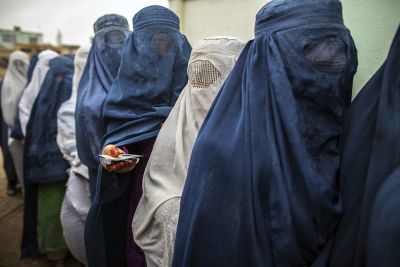In Afghanistan, women are being subjugated. In the West, they are being erased.

“We are being treated like criminals just because we are girls. Afghanistan has turned into a jail for us.” This is how one Afghan girl describes life under the Taliban. Girls across the country had their hopes dashed last week when Taliban authorities reneged on their promise to allow girls’ secondary schools (above 6th grade) to reopen. The decision was so last minute that the students were not told until they arrived at school Wednesday morning and had to be sent home.
One girl tearfully recounted to her mother, “Mom, they didn’t let me enter my school. They’re saying girls aren’t allowed.” Instead of attending classes and progressing in their education, she and other Afghan girls will be expected to stay inside their homes and help with housework.
The pretext given by some Taliban officials is they were unable to plan for a school uniform dress code for teenage girls. This pathetic excuse is no doubt familiar to Afghans who previously lived under Taliban rule. When the Taliban controlled Afghanistan from 1996-2001, education for girls was similarly restricted. But in recent months, Taliban officials have tried to insist that they’ve changed over the last two decades. However, all pretense of modernization within the Taliban is now over; that is a deeply tragic reality for women and girls in Afghanistan who simply want to go to school and live normal lives.
While Afghan women and girls were grieving the loss of basic freedoms and opportunities because of their sex, a very different scene played out nearly 7,000 miles away in a U.S. Senate chamber. Senator Marsha Blackburn (R-Tenn.) asked Judge Ketanji Brown Jackson, President Biden’s Supreme Court nominee, to define the word “woman.” Jackson responded, “No. I can’t … I’m not a biologist.” It struck many as odd that a well-educated and successful person — whom many hail as a pioneering black woman herself — was unable or refused even to define the word “woman.”
But this ambiguity on the nature of womanhood isn’t limited to a Supreme Court confirmation hearing; it’s taking our culture by storm. In recent weeks, we’ve seen biological males who self-identify as women kicking biological females off the podium in women’s sports and taking their slots in “woman of the year” designations.
Clarity on the sexes is needed now more than ever. But the truth is not that complicated. Writing in the National Review, Madeleine Kearns explains why no one needs a degree in biology to know what a woman is: “Sex is observable at birth, detectable long after death, and demonstrable in our chromosomes, gametes, and reproductive organs. We are reminded of our sex every time we go to the bathroom or look in a mirror. The sex of the vast majority of people is identifiable at a glance.”
The West’s erasure of women puts women and girls at physical risk in shared spaces like bathrooms and locker rooms and robs them of opportunities that policies like Title IX were supposed to protect. It also has the potential to undermine global momentum on women’s rights. What does it mean for international women’s rights advocacy if the West can no longer agree on a definition for “woman?”
While the West is embroiled in debate about gender identity ideology, the heart-wrenching and horrifying situations faced by many women around the world are being overlooked. Female North Korean defectors forcibly sent back to North Korea endure rape, torture, forced labor, and forced abortions in labor camps. Young Christian and Hindu girls in Pakistan are at risk of being forcibly converted and married to their Muslim kidnappers. Uyghur women are targets of China’s genocide, undergoing brutal mandatory sterilization, forced abortions, and arbitrary detainment.
Women have come a long way in gaining equal rights and protections in much of the world. Yet, the West does a disservice to those women still fighting for basic rights when it sidelines their plight in favor of trendy, dangerous, and incoherent gender identity ideology.
Women and girls around the world aren’t being helped by the West’s newfound confusion about the sexes. We shouldn’t be afraid to say what a woman is — a biological female — and defend the human dignity of women around the world. We must convey the value and goodness of women’s unique qualities — not ignore them, undermine them and certainly not erase them.
Originally published at the Family Research Council.
Arielle Del Turco is Assistant Director of the Center for Religious Liberty at Family Research Council.




























